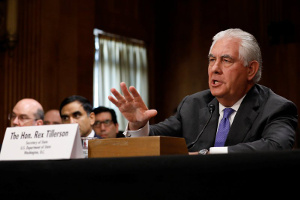The US stance on Saudi Arabia and its allies’ hostility toward Qatar, including an outright blockade, has not been particularly consistent in the last couple of weeks. State Department spokeswoman Heather Nauert took a more direct position against the blockade today, but that is just raising more questions.
 Nauert very directly faulted the Saudis for their move against Qatar, noting neither they nor other nations involved have offered any details to back up their allegations, and suggesting that the blockade was not about Qatar’s alleged support for terrorism, but long-standing grievances among GCC countries.
Nauert very directly faulted the Saudis for their move against Qatar, noting neither they nor other nations involved have offered any details to back up their allegations, and suggesting that the blockade was not about Qatar’s alleged support for terrorism, but long-standing grievances among GCC countries.
This is largely in keeping with what you’d figure would be the US position on Qatar, a long-time ally, but runs contrary to President Trump, who personally took credit for the Saudi-led move and has repeatedly parroted Saudi allegations against the Qatari government since then.
Nauert addressed this, insisting that the US position “has not changed” on Qatar despite the wildly inconsistent statements of policy, noting that “the secretary likes results,” and that the State Department is unhappy with the long-standing tensions within the GCC fueling this issue with no steps toward resolution.
The Saudis have suggested they’re going to issue a list of grievances at some point soon, but it’s not clear when this will happen, or if it will be different from their massive list of demands early in the blockade. Either way, the lack of clarity on what they’re actually accusing Qatar of, as the laundry list of allegations continues to grow, isn’t lending itself to a negotiated settlement.


